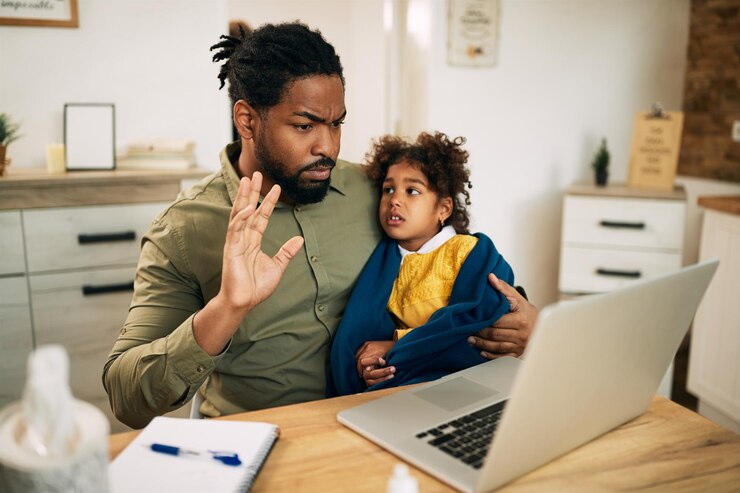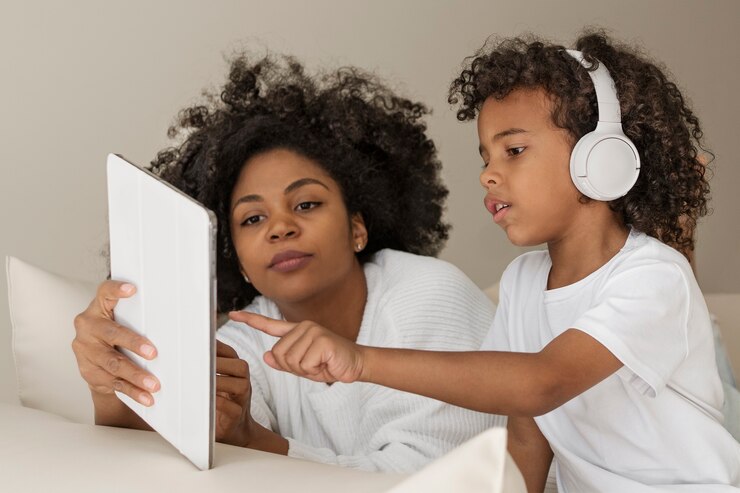As Nigerian parents, we’re used to being hands-on when it comes to our kids. We make sure they do well in school, we teach them manners, and we emphasize the importance of respect. But now, there’s a whole new frontier we need to tackle — the internet.
Keeping our kids safe online is becoming one of the biggest challenges of modern-day parenting.
With the internet at their fingertips, kids today are exposed to both the best and the worst the online world has to offer.
From social media to gaming platforms, knowing how to protect them while still allowing them to explore and learn can feel like walking a tightrope.
But don’t worry! Whether your child is a pro at downloading apps or just figuring out the magic of YouTube, this guide will show you how to set boundaries and keep them safe online.
Set Boundaries for Screen Time

We all know the struggle: trying to pry your child away from the TV, phone, or tablet can feel like a battle. But setting limits on screen time is essential for their overall well-being.
In Nigeria, where extended family gatherings, homework, and religious activities take up time, it’s still easy for kids to get lost in hours of screen time.
Experts recommend no more than 1-2 hours of recreational screen time per day for kids. But beyond the time, it’s important to think about how they’re using screens.
Encourage educational content or activities that promote creativity over endless social media scrolling or gaming.
One trick? Screen-free zones. Make certain areas of the house (like the dining table or bedrooms) places where devices aren’t allowed. This encourages family interaction and ensures healthier habits.
Use Monitoring Apps to Stay Informed

Technology can be a double-edged sword, but it’s also your best friend when it comes to monitoring your kids’ online activities.
Tools like Google Family Link allow you to monitor app usage, set limits, and even approve or block apps they want to download.
For more in-depth monitoring, apps like Qustodio let you see what websites your child is visiting and how long they’re spending on each one.
You can also set time limits for specific apps, making sure your kids don’t spend the entire day on TikTok or YouTube.
Educate Your Kids About Online Safety

No matter how many boundaries you set or apps you use, the most powerful tool in your arsenal is communication.
Teach your kids about the risks of sharing personal information online. Let them know why it’s important to avoid talking to strangers or sharing details like their full name, address, or school.
In Nigeria, where scamming and cyber threats are on the rise, educating your kids early about phishing, scams, and the importance of online privacy is crucial.
Make it a regular discussion rather than a one-off lecture. This will help your kids feel comfortable coming to you if they encounter anything suspicious or inappropriate.
Use Safe Search and Restricted Mode

Most online platforms now have built-in safety features. On YouTube, you can turn on Restricted Mode to filter out inappropriate content.
Similarly, for Google searches, you can enable SafeSearch to prevent adult content from showing up in results.
These filters aren’t 100% foolproof, but they do add an extra layer of protection.
Pair this with regular check-ins, and you’ll be better equipped to keep unwanted content at bay.
Create an Open Line of Communication

While boundaries and monitoring are important, trust is the key ingredient in managing your child’s online presence.
Make sure your kids know they can talk to you about anything they encounter online without fear of punishment or judgment.
This trust will be crucial if they ever come across cyberbullying, inappropriate content, or harmful behavior.
Encourage them to ask questions and share what they’re doing online, from the games they play to the people they chat with.
This open line of communication fosters mutual respect and ensures they’ll come to you if they ever feel unsafe.
Truth is the internet isn’t going away, and as our kids grow up in a digital-first world, it’s our responsibility as Nigerian parents to make sure they’re navigating it safely.
By setting screen time boundaries, using tech tools to monitor their activities, and having open, honest conversations about online safety, we can help our kids enjoy the benefits of technology while staying safe.
For more insights on tackling the challenging phases of parenting and a safe space to share your experiences, join the “Parenting Community” on Fusion






5,231 Responses
https://massantibiotics.com/# buy antibiotics from india
bactrim no prescription: buy antibiotics – cheap zithromax pills
Av Tadalafil: AvTadalafil – Av Tadalafil
MassAntibiotics Mass Antibiotics buy generic zithromax no prescription
Uofm Sildenafil: UofmSildenafil – no prescription generic sildenafil online
https://uofmsildenafil.com/# buy sildenafil 100mg
best online doctor for antibiotics: MassAntibiotics – Mass Antibiotics
http://uofmsildenafil.com/# UofmSildenafil
https://massantibiotics.com/# MassAntibiotics
cheap bactrim Mass Antibiotics zithromax 500 without prescription
MassAntibiotics: Over the counter antibiotics for infection – over the counter antibiotics
Av Tadalafil: AvTadalafil – tadalafil 2.5 mg tablets
Mass Antibiotics: bactrim no prescription – amoxicillin 500 mg purchase without prescription
https://uofmsildenafil.xyz/# UofmSildenafil
https://pennivermectin.com/# stromectol tab 3mg
https://pennivermectin.xyz/# ivermectin cream before and after
Penn Ivermectin: Penn Ivermectin – PennIvermectin
stromectol australia: PennIvermectin – ivermectin buy australia
https://massantibiotics.com/# MassAntibiotics
stromectol how much it cost stromectol australia Penn Ivermectin
https://avtadalafil.com/# Av Tadalafil
PennIvermectin: Penn Ivermectin – PennIvermectin
tadalafil 20mg online canada: tadalafil united states – buy tadalafil from canada
https://uofmsildenafil.xyz/# Uofm Sildenafil
http://avtadalafil.com/# AvTadalafil
Uofm Sildenafil: sildenafil price in usa – UofmSildenafil
cost of ivermectin 3mg tablets ivermectin 6 Penn Ivermectin
buy generic tadalafil online: tadalafil online australia – buy tadalafil 20mg price in india
http://massantibiotics.com/# MassAntibiotics
buy antibiotics: MassAntibiotics – Over the counter antibiotics pills
http://pennivermectin.com/# stromectol ingredient